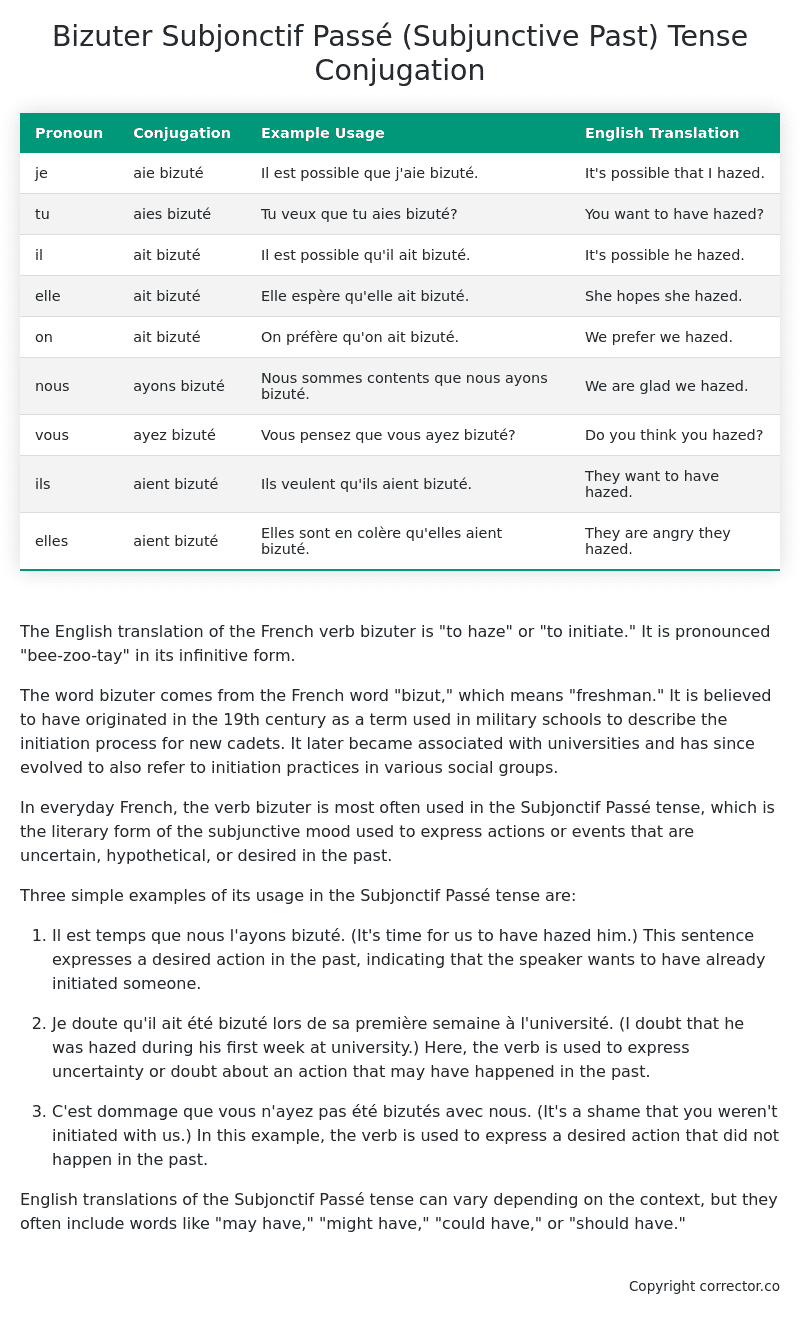Subjonctif Passé (Subjunctive Past) Tense Conjugation of the French Verb bizuter
Introduction to the verb bizuter
The English translation of the French verb bizuter is “to haze” or “to initiate.” It is pronounced “bee-zoo-tay” in its infinitive form.
The word bizuter comes from the French word “bizut,” which means “freshman.” It is believed to have originated in the 19th century as a term used in military schools to describe the initiation process for new cadets. It later became associated with universities and has since evolved to also refer to initiation practices in various social groups.
In everyday French, the verb bizuter is most often used in the Subjonctif Passé tense, which is the literary form of the subjunctive mood used to express actions or events that are uncertain, hypothetical, or desired in the past.
Three simple examples of its usage in the Subjonctif Passé tense are:
-
Il est temps que nous l’ayons bizuté. (It’s time for us to have hazed him.) This sentence expresses a desired action in the past, indicating that the speaker wants to have already initiated someone.
-
Je doute qu’il ait été bizuté lors de sa première semaine à l’université. (I doubt that he was hazed during his first week at university.) Here, the verb is used to express uncertainty or doubt about an action that may have happened in the past.
-
C’est dommage que vous n’ayez pas été bizutés avec nous. (It’s a shame that you weren’t initiated with us.) In this example, the verb is used to express a desired action that did not happen in the past.
English translations of the Subjonctif Passé tense can vary depending on the context, but they often include words like “may have,” “might have,” “could have,” or “should have.”
Table of the Subjonctif Passé (Subjunctive Past) Tense Conjugation of bizuter
| Pronoun | Conjugation | Example Usage | English Translation |
|---|---|---|---|
| je | aie bizuté | Il est possible que j’aie bizuté. | It’s possible that I hazed. |
| tu | aies bizuté | Tu veux que tu aies bizuté? | You want to have hazed? |
| il | ait bizuté | Il est possible qu’il ait bizuté. | It’s possible he hazed. |
| elle | ait bizuté | Elle espère qu’elle ait bizuté. | She hopes she hazed. |
| on | ait bizuté | On préfère qu’on ait bizuté. | We prefer we hazed. |
| nous | ayons bizuté | Nous sommes contents que nous ayons bizuté. | We are glad we hazed. |
| vous | ayez bizuté | Vous pensez que vous ayez bizuté? | Do you think you hazed? |
| ils | aient bizuté | Ils veulent qu’ils aient bizuté. | They want to have hazed. |
| elles | aient bizuté | Elles sont en colère qu’elles aient bizuté. | They are angry they hazed. |
Other Conjugations for Bizuter.
Le Present (Present Tense) Conjugation of the French Verb bizuter
Imparfait (Imperfect) Tense Conjugation of the French Verb bizuter
Passé Simple (Simple Past) Tense Conjugation of the French Verb bizuter
Passé Composé (Present Perfect) Tense Conjugation of the French Verb bizuter
Futur Simple (Simple Future) Tense Conjugation of the French Verb bizuter
Futur Proche (Near Future) Tense Conjugation of the French Verb bizuter
Plus-que-parfait (Pluperfect) Tense Conjugation of the French Verb bizuter
Passé Antérieur (Past Anterior) Tense Conjugation of the French Verb bizuter
Futur Antérieur (Future Anterior) Tense Conjugation of the French Verb bizuter
Subjonctif Présent (Subjunctive Present) Tense Conjugation of the French Verb bizuter
Subjonctif Passé (Subjunctive Past) Tense Conjugation of the French Verb bizuter (this article)
Subjonctif Imparfait (Subjunctive Imperfect) Tense Conjugation of the French Verb bizuter
Subjonctif Plus-que-parfait (Subjunctive Pluperfect) Tense Conjugation of the French Verb bizuter
Conditionnel Présent (Conditional Present) Tense Conjugation of the French Verb bizuter
Conditionnel Passé (Conditional Past) Tense Conjugation of the French Verb bizuter
L’impératif Présent (Imperative Present) Tense Conjugation of the French Verb bizuter
L’infinitif Présent (Infinitive Present) Tense Conjugation of the French Verb bizuter
Struggling with French verbs or the language in general? Why not use our free French Grammar Checker – no registration required!
Get a FREE Download Study Sheet of this Conjugation 🔥
Simply right click the image below, click “save image” and get your free reference for the bizuter Subjonctif Passé tense conjugation!

Bizuter – About the French Subjonctif Passé (Subjunctive Past) Tense
Formation of the Subjonctif Passé
Everyday Usage Patterns
Interactions with Other Tenses
Present tense
Future tense
Conditional
Summary
I hope you enjoyed this article on the verb bizuter. Still in a learning mood? Check out another TOTALLY random French verb conjugation!


